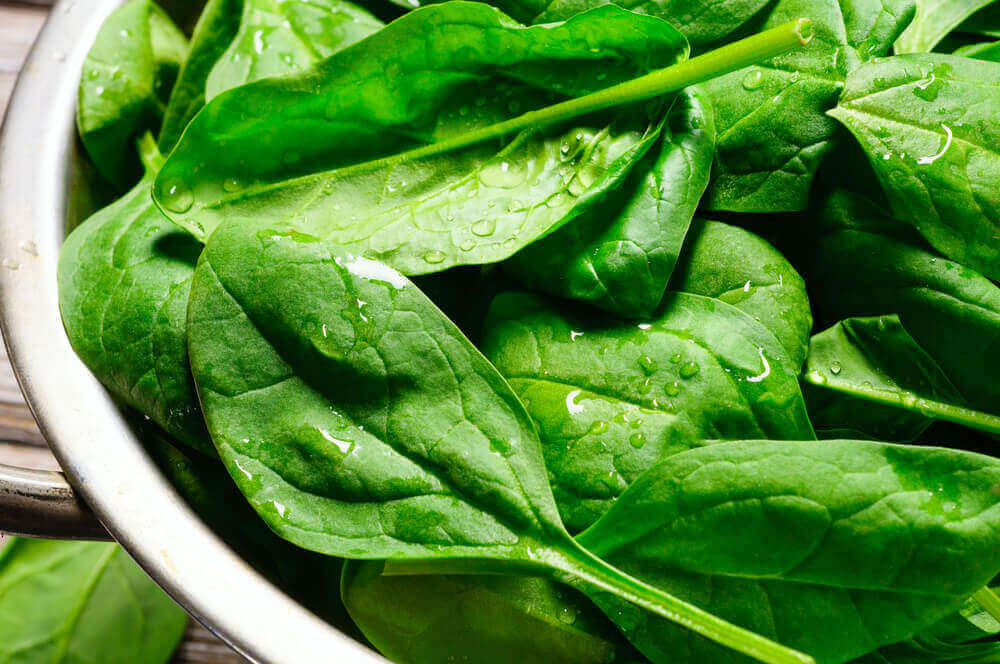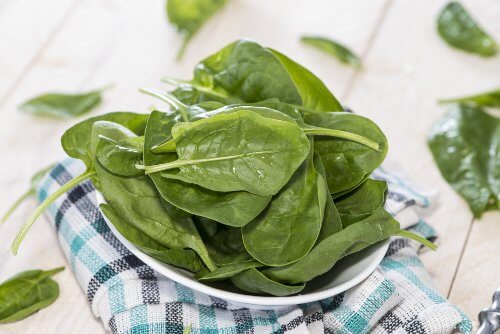Seven Reasons to Eat Spinach Every Day of the Week


Written and verified by psychologist Valeria Sabater
After you’ve read this article, you’ll have no doubt about the benefits of eating spinach. Indeed, few vegetables represent such a rich and varied source of minerals, vitamins, and phytonutrients.
So much so, that spinach forms a part of any diet that’s considered healthy.
It’s an essential base of nutrients for children and great for enhancing their cognitive processes.
Furthermore, there are infinite ways to consume this vegetable that can be enjoyed all year round.

You can use spinach in many different dishes, although the best way to preserve its benefits is to eat it in its natural form.
You just have to make sure you wash it well. Then, serve it in your dishes combined with other foods that are rich in vitamin C, as this enhances its nutrients.
With a little imagination, you can include spinach as part of your daily diet. It’ll provide you with all the benefits you need to lead a healthy life.
1. Spinach is good for your memory

Spinach is on the list of foods that your brain would consider essential.
It contains minerals like folic acid, as well as vitamins A, B6, and C, and various antioxidants that help to prevent cognitive and neuronal deterioration.
Also, the potassium in spinach is extremely helpful in increasing blood flow to the brain. This maximizes basic processes like memory and concentration. In fact, a study conducted by the National Autonomous University of Mexico states that spinach is a recommended food for ‘feeding the brain’.
You also might be interested to read: Supplements to Improve Memory and Concentration
2. It supports your vision
Spinach is a great source of beta-carotene, lutein, and xanthene. These three antioxidants are extremely beneficial for vision, as confirmed in a study conducted by the University of Florida (USA).
Beta-carotene will provide even more benefits if you eat spinach cooked instead of raw.
Interestingly, its content of vitamin A helps treat itchy eyes and any inflammation or irritation associated with allergies, as confirmed in research conducted by the London School of Hygiene and Tropical Medicine (UK).
3. It helps tone your muscles

If you’re thinking about losing weight and are worried about flabbiness, start eating spinach every day. Add it to your salads, vegetable smoothies, or any other way you like.
Spinach contains antioxidants that help strengthen your muscles. It does this by nourishing them with blood rich in oxygen and minerals which makes them stronger.
4. Spinach fights osteoporosis
Spinach is a great source of vitamin K. This vitamin isn’t as well known as others. However, it’s extremely important because it helps you ‘retain’ calcium in your bones. This leads to bone mineralization, strengthening your teeth and nails.
A study conducted by the Tehran University of Medical Sciences (Iran) emphasizes the effect of vitamin K in preventing osteoporosis.
In addition, spinach is rich in manganese, copper, magnesium, zinc and phosphorus.
You also might like to read: 5 Reasons Why Magnesium Helps to Improve Your Mental Capacities
5. It improves your metabolism

Spinach has a great deal of protein for a vegetable. Furthermore, it’s easy to digest and has a really positive impact on your metabolism. In fact, it helps to accelerate it.
- The internal energy that it provides you with stimulates all the systems in your body so that they can function optimally.
- It’s a filling food, which makes it ideal if you’re trying to lose weight.
6. It prevents atherosclerosis
Atherosclerosis is caused by the hardening of the arteries. This silent but serious disease is one of our biggest enemies.
However, if you eat spinach every day, you’ll benefit from a pigment called lutein. This is helpful in preventing the appearance of atherosclerosis, heart attacks, and cerebral-vascular accidents, as confirmed in a study conducted by Palermo University (Italy).
Thanks to lutein, you can reduce cholesterol and fat deposits in your blood vessels.
7. It prevents inflammation

Spinach is rich in anti-inflammatory compounds and antioxidants. These are valuable for preventing and treating inflammation in the body. This is confirmed in a study published in the scientific journal, Food and Function.
Possible side effects of spinach
Spinach consumption is considered safe for the entire population in general. That said, in some individuals it can cause adverse side effects:
- Spinach contains a high amount of oxalates and calcium. For this reason, if you have a tendency or risk of forming kidney stones, you should limit your intake or consult your doctor about its consumption.
- As we mentioned earlier, spinach is also a source of vitamin K and one of its functions in the body is its role in blood coagulation. Therefore, if you’re taking anticoagulant medications, you must consult with your doctor before making any drastic changes to your diet or consuming high quantities of spinach.
As you may already know, inflammation is extremely dangerous for your heart. It’s also associated with common conditions like gout and arthritis.
Include spinach in a balanced diet to obtain its benefits
As you can see, the benefits of spinach are many and interesting so it’s worth making a little effort, using your imagination, and eating it once a day.
All it takes is a small handful to benefit from the many properties of this healthy vegetable.
All cited sources were thoroughly reviewed by our team to ensure their quality, reliability, currency, and validity. The bibliography of this article was considered reliable and of academic or scientific accuracy.
- Akbari S, Rasouli-Ghahroudi A. A. Vitamin K and bone metabolism: a review of the latest evidence in preclinical studies. BioMed Research International. Junio 2018. 4629383.
- Bamji JE, Bamji NS. Spinach. British Medical Journal. Marzo 1953. 1 (4811): 674-675.
- Buscemi S, Coréelo D, et al. The effect of lutein on eye and extra-eye health. Nutrients. Septiembre 2018. 10 (9): 1321.
- Chang C-H, Wang Y-W, et al. A practical approach to minimize the interaction of dietary vitamin K and warfarin. Journal of Clinical Pharmacy and Therapeutics. Febrero 2014. 39 (1): 56:60.
- Dwyer JH, Navab M, Dwyer KM, Hassan K, Sun P, Shircore A, et al. Oxygenated carotenoid lutein and progression of early atherosclerosis: The Los Angeles atherosclerosis study. Circulation. 2001. 103 (24): 2922-7.
- Gilbert C. The eye signs of vitamin A deficiency. Community Eye Health Journal. 2013. 26 (84): 66-67.
- Koushan K, Rusovici R, et al. The role of lutein in eye-related disease. Nutrients. Mayo 2013. 5 (5): 1823-1839.
- Lewis Roberts J, Moreau R. Funcional properties of spinach (Spinacia oleracea L) phytochemicals and bioactives. Food & Function. Junio 2016. 7 (8).
- Massey L. K, Roman-Smith H, Sutton R. A. Effect of dietary oxalate and calcium on urinary oxalate and risk of formation of calcium oxalate kidney stones. Journal of the American Dietetic Association. Agosto 1993. 93 (8): 901-6.
- Mataix Albert, B. Efecto de los ácidos grasos de la dieta y la suplementación con coenzima Q10 sobre el estrés oxidativo cerebral durante el envejecimiento. 2005.
- Skough K, Krossén C, Heiwe S, Theorell H, Borg K. Effects of resistance training in combination with coenzyme Q10 supplementation in patients with post-polio: A pilot study. Journal of Rehabilitation Medicine. Octubre 2008. 40 (9): 773-5.
This text is provided for informational purposes only and does not replace consultation with a professional. If in doubt, consult your specialist.








